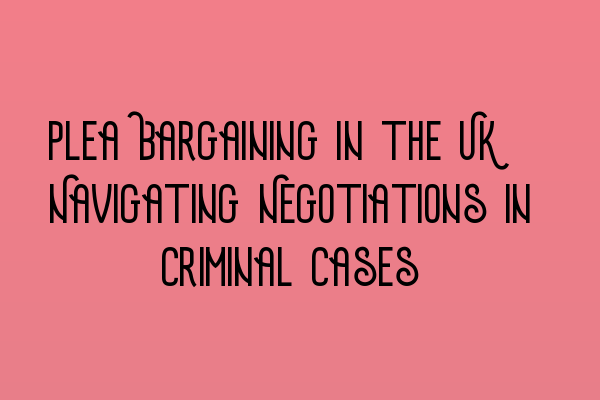Plea Bargaining in the UK: Navigating Negotiations in Criminal Cases
Welcome to the SQE Criminal Law & Practice Law UK blog! In this post, we will explore the topic of plea bargaining in the UK and how to effectively navigate negotiations in criminal cases. Plea bargaining plays a significant role in the criminal justice system and can have a profound impact on the outcome of a case. Understanding the intricacies of plea bargaining is crucial for both solicitors and defendants.
What is Plea Bargaining?
Plea bargaining is a process where the prosecution and the defense negotiate an agreement in a criminal case. It allows for the resolution of a case without going to trial and can result in reduced charges, lesser sentences, or dismissal of certain charges in exchange for a guilty plea. Plea bargaining can benefit both parties by saving time and resources, avoiding the uncertainties of trial, and potentially achieving a more favorable outcome for the defendant.
However, it is essential to note that plea bargaining in the UK operates within a specific legal framework and must adhere to certain guidelines set by the judiciary. It is not available in all cases and should be approached with caution and legal expertise. Solicitors skilled in negotiation techniques and knowledgeable about the specific laws and regulations surrounding plea bargaining are essential for the successful navigation of this process.
Negotiating a Plea Bargain
When negotiating a plea bargain, solicitors play a crucial role in advocating for their clients’ best interests. Through skillful negotiation and thorough preparation, solicitors can strive to achieve the most favorable outcome for their clients. The negotiation process may involve discussions with the prosecutor and considerations of the evidence, witness statements, the strength of the prosecution’s case, and any mitigating factors that may warrant a lesser sentence.
Having a solid understanding of the Criminal Procedure Rules, Sentencing Guidelines, and case law is essential for effective plea bargaining. Solicitors must meticulously assess the strengths and weaknesses of the case and use this knowledge to strategically negotiate with the prosecution. By presenting compelling arguments and leveraging relevant legal precedents, solicitors can seek to secure the best possible deal for their clients.
It is crucial for solicitors to maintain open lines of communication with their clients throughout the negotiation process. Solicitors should ensure that their clients fully understand the implications of the proposed plea bargain and are comfortable with the potential outcomes. Providing sound legal advice, presenting realistic expectations, and keeping clients informed at every stage are critical components of effective representation.
Challenges in Plea Bargaining
While plea bargaining offers benefits, it also presents challenges that must be carefully navigated. The negotiation process requires a delicate balance between advocating for the defendant’s interests while maintaining the ethical responsibilities bestowed upon solicitors. Solicitors must always act in the best interests of their clients while adhering to professional standards and the Rule of Law.
Moreover, plea bargaining relies on the cooperation of the prosecution. The prosecution may have their own priorities, policies, and guidelines that influence their willingness to negotiate. Solicitors need to be adept at assessing the prosecutor’s position, understanding the potential implications of rejecting a plea bargain offer, and developing persuasive strategies to achieve the desired outcome.
Conclusion
Plea bargaining is a complex and highly skilled negotiation process that requires expertise in criminal law, knowledge of legal precedents, and the ability to strategically navigate the intricacies of the UK criminal justice system. Solicitors specializing in criminal law, such as those at SQE Criminal Law & Practice Law UK, are well-equipped to guide defendants through the plea bargaining process, ensuring their interests are represented effectively.
If you require assistance in plea bargaining or any other aspects of criminal law, please do not hesitate to contact us. Our team of experienced solicitors is ready to provide the legal expertise and guidance you need.
Keywords: Plea Bargaining, UK Criminal Law, Negotiations in Criminal Cases, SQE Criminal Law & Practice Law UK, Criminal Procedure Rules, Sentencing Guidelines, Negotiation Techniques, Solicitors, Defendant, Prosecution, Mitigating Factors, Legal Precedents, Cooperation, Rule of Law.
